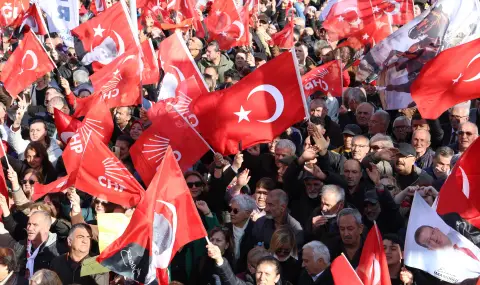When Ekrem Imamoglu, the arrested opposition leader in Turkey, appeared in court on Friday, where one of the many cases against him was being heard, he was greeted by supporters outside the building. They say the charges against Imamoglu are a politically motivated move aimed at preventing him from running for president. He is seen as Erdogan's strongest opponent and the one most likely to end his more than two-decade rule.
The hesitant European response
If convicted, Imamoglu could be banned from holding public office. Many see the charges as politically motivated, but the government in Ankara says the judiciary is independent. But despite weeks of anti-government protests and a court case that many see as another step towards authoritarianism, the European Union's response has been rather tepid.
According to Selim Kuneralp, Turkey's former ambassador to the EU, the EU was “quite hesitant“ in its reaction to the arrest of the Istanbul mayor and the subsequent crackdown on protesters. “I think EU leaders did not want to appear too hostile to President Erdogan”, the diplomat told DW.
Turkey is a candidate for EU membership and is expected to maintain high standards in the areas of the rule of law, human rights and media freedom. However, experts say Turkey's growing strategic importance as a NATO member seems to be influencing Europe's response when it comes to violating these values.
"Istanbul mayor not in EU's top 10 priorities"
The Council of Europe has already called for Imamoglu's "immediate release". Some German politicians have sided with the protesters. Green Party co-chair Felix Banaszak even visited Turkey to "support democratic forces". "There is more than one indication that the judiciary is no longer independent", Serpil Midyatli of the German Social Democratic Party told DW.
EU Enlargement Commissioner Marta Koss canceled her visit to Turkey in protest at the mayor's detention. "The European Union is deeply concerned by the detention and arrest of Istanbul Mayor Ekrem Imamoglu and other public figures, including media and civil society representatives," Kos told the European Parliament in early April, describing the situation as a "backsliding from democracy." "We have repeatedly stated that Turkey must effectively reverse the negative trend in the area of fundamental rights and the rule of law," she added. But she referred to the limitations the EU faces in its stance, noting that "in Syria, in Russia's aggressive war against Ukraine, in Lebanon and in the South Caucasus, Turkey is a strategic partner of Europe."
Asli Aydintasbaş of the European Council on Foreign Relations said the EU's response was a result of the various geopolitical challenges the Community faces. According to her, the EU has moved to a “cool-blooded and pragmatic approach“, as cooperation with Turkey in various regional crises that have a direct bearing on the EU is necessary. “It is clear that the mayor of Istanbul is not in the top 10 priorities of the EU towards Turkey”, she adds.
Migration and the mediation role in Ukraine
In 2015, Brussels concluded an agreement with Turkey. Under it, the country received nine billion euros to limit illegal migration to Europe. In addition, Turkey has maintained good relations with Russia even after the war in Ukraine began. There is a growing feeling that Ankara will have to play an important role in preserving peace, if one is agreed. “The security of Europe is unthinkable without Turkey”, President Erdogan recently said. Experts say Turkish soldiers could be sent as peacekeepers to Ukraine after an agreement is reached between Moscow and Kiev.
NATO Secretary-General Marius Rutte has repeatedly stressed Turkey's importance for both the Black Sea grain deal and Ukraine's supply of ammunition, weapons and drones. At a press conference in early April, Rutte avoided a question about Imamoglu's arrest. Polish Prime Minister Donald Tusk said he hoped Turkey would play a leading role in ending the war in Ukraine.
According to Asli Aydintasbas, Erdogan is trying to reach an agreement with his NATO allies. “Turkey is currently the biggest power in the Black Sea region. It is telling its Western partners, its allies, that in return for pushing back Russia, it wants support for its military modernization efforts“, the expert commented. “The message is: We will not fight Russia, but our strong presence means preventing Russia from controlling the Black Sea.“
The EU is losing its leverage
Since the beginning of the war in Ukraine, Turkey has refused to impose sanctions on Russia and continues to buy Russian gas and oil. There are concerns that due to its economic dependence on Russia, Turkey may remain closer to Moscow than to Brussels. The “Turkish Stream“ gas pipeline supplies gas to the country, Turkey is also the largest exporter of agricultural products to Russia and welcomes millions of tourists from there every year.
As Russia increasingly penetrates Turkey, the EU has lost its leverage after freezing Turkey's membership bid. “The EU has no leverage because there are no negotiations on Turkey's accession process, on deepening the customs union or on visa liberalization“, commented former Turkish ambassador Kuneralp.
Experts believe that while stronger ties with Turkey offer serious strategic advantages for the EU, moving too far away from European values could backfire.
Author: Anshal Vohra
